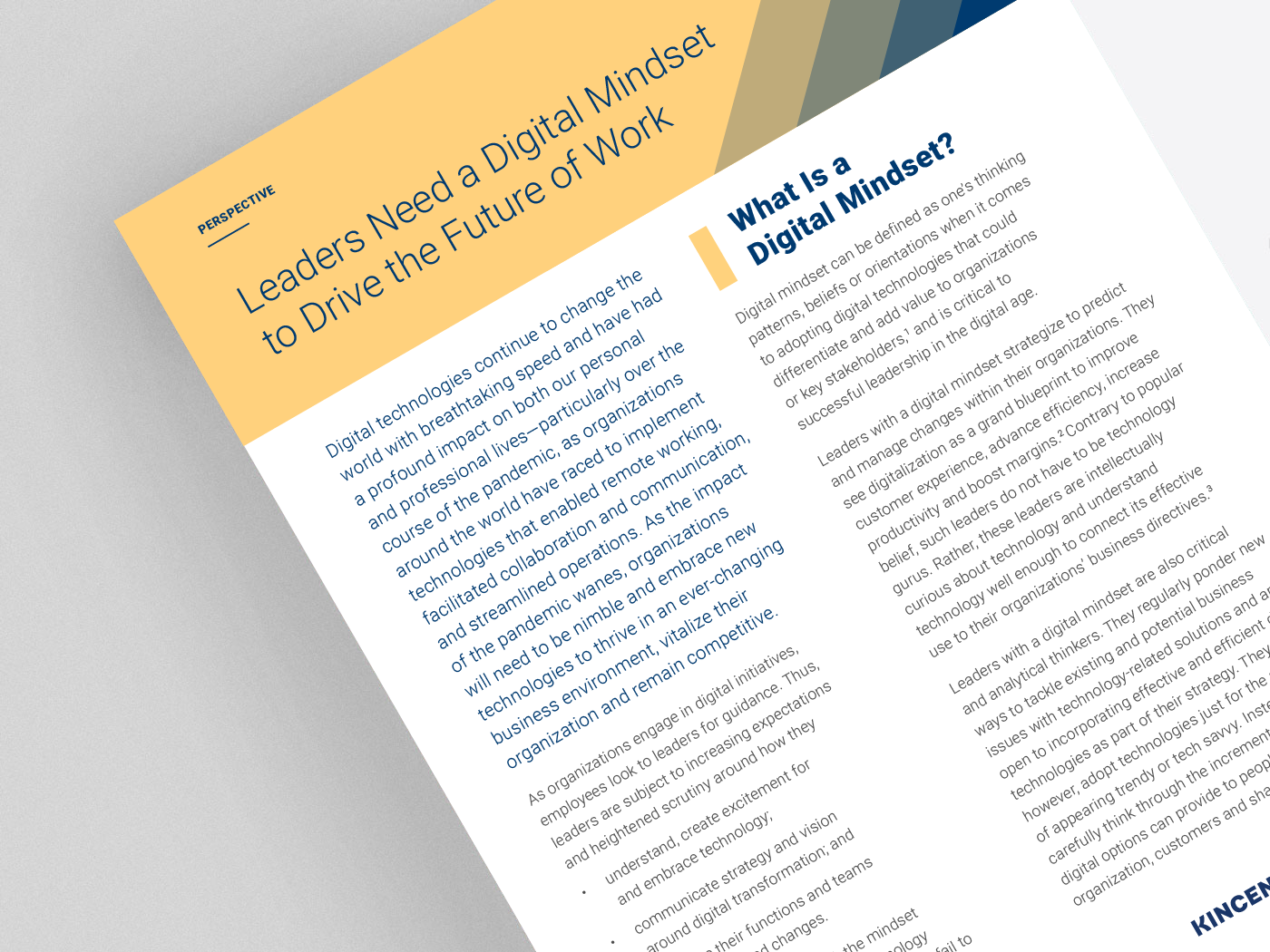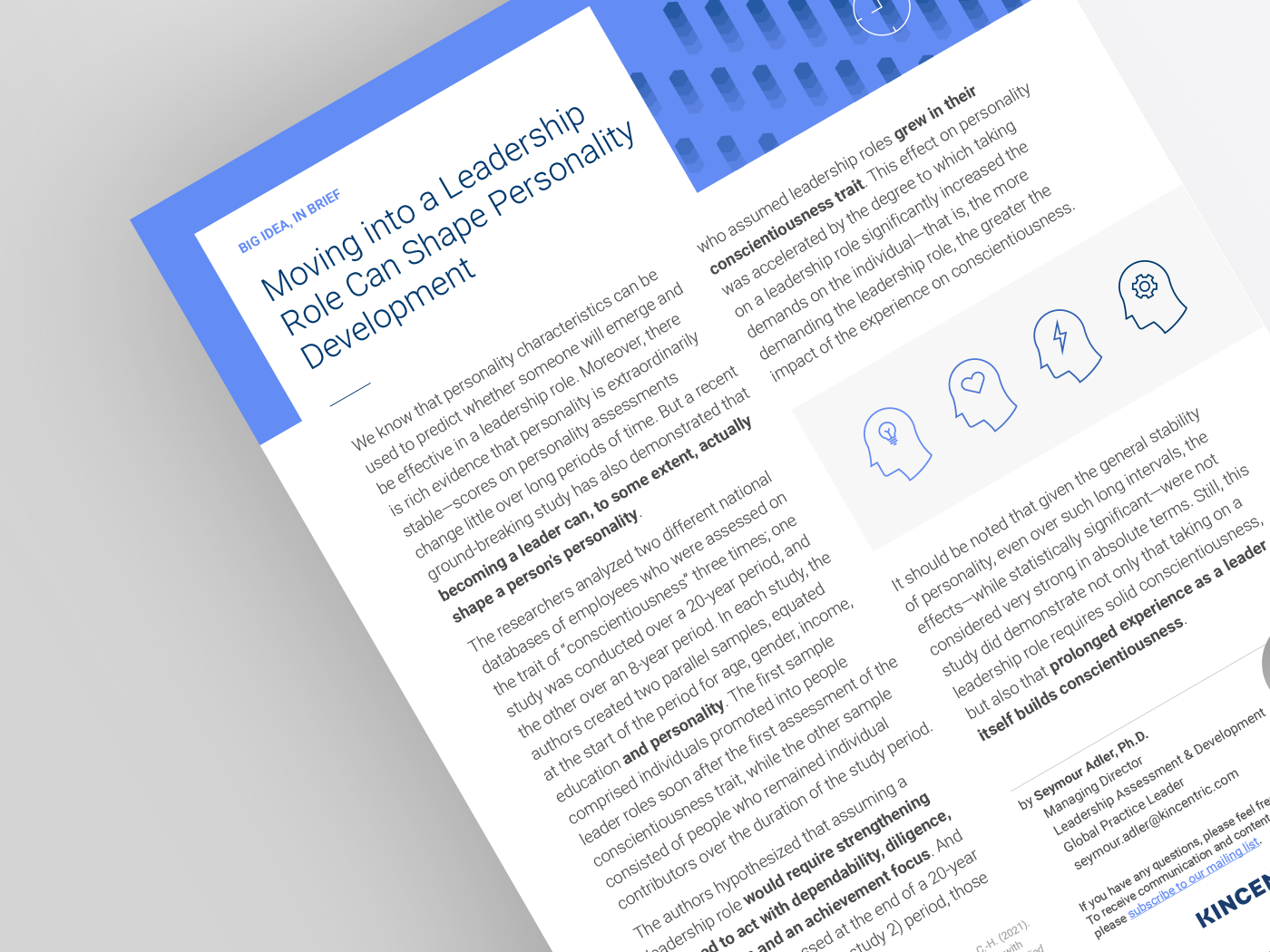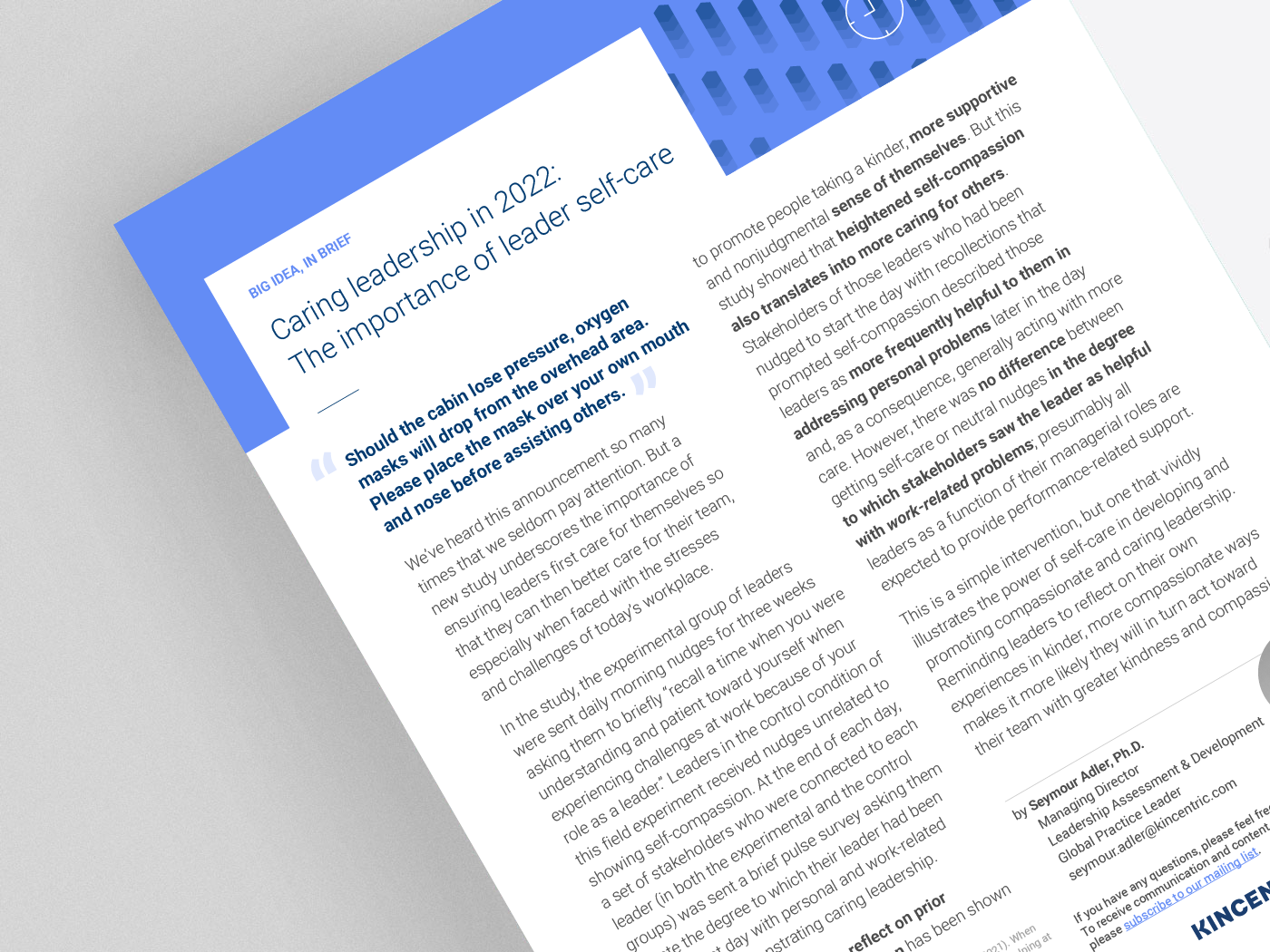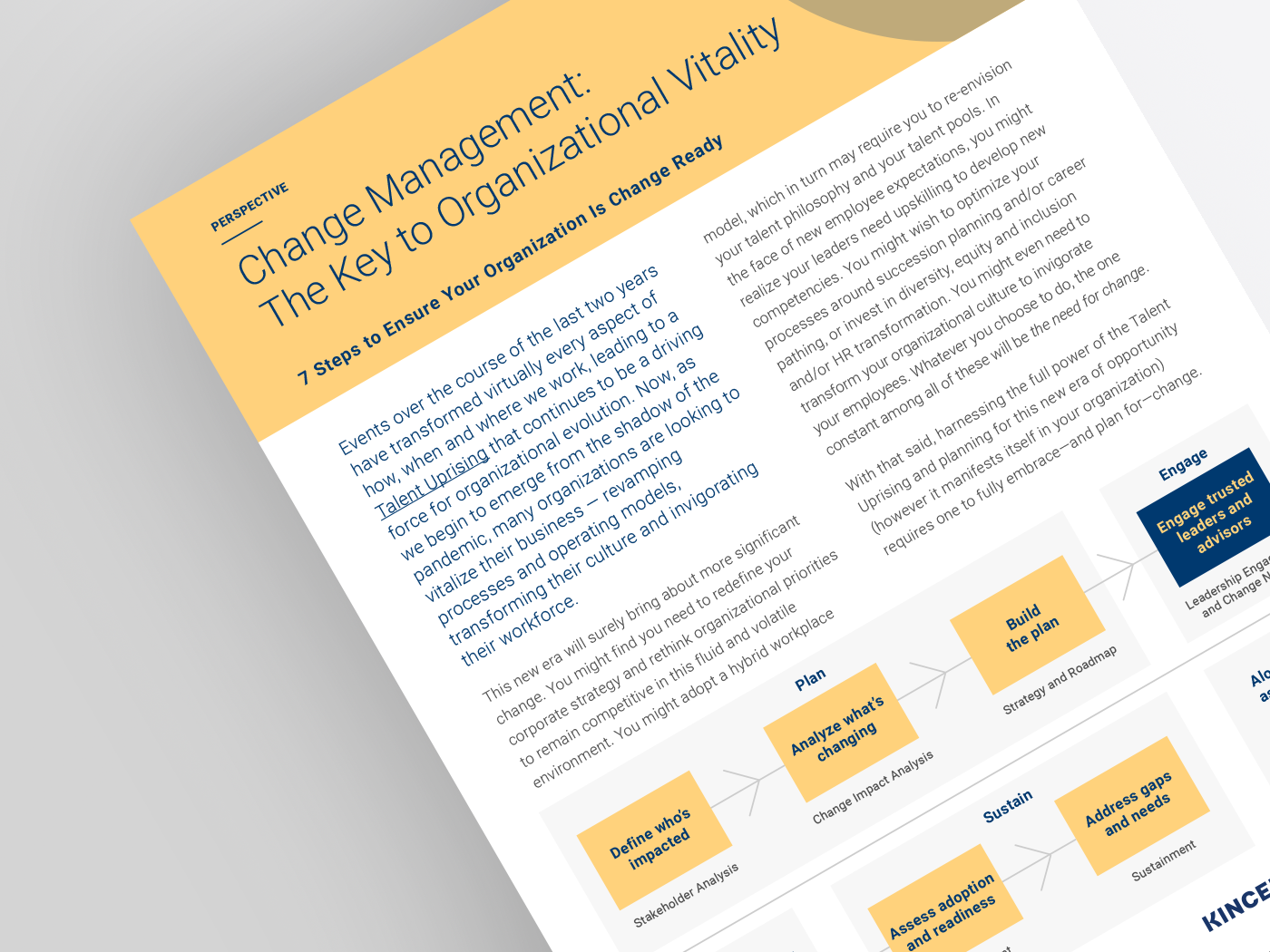
Digital technologies continue to change the world with breathtaking speed and have had a profound impact on both our personal and professional lives—particularly over the course of the pandemic, as organizations around the world have raced to implement technologies that enabled remote working, facilitated collaboration and communication, and streamlined operations. As the impact of the pandemic wanes, organizations will need to be nimble and embrace new technologies to thrive in an ever-changing business environment, vitalize their organization and remain competitive.
As organizations engage in digital initiatives, employees look to leaders for guidance. Thus, leaders are subject to increasing expectations and heightened scrutiny around how they
However, many leaders lack the mindset needed to successfully drive technology implementation initiatives, while others fail to understand the important role they play.
Digital mindset can be defined as one’s thinking patterns, beliefs or orientations when it comes to adopting digital technologies that could differentiate and add value to organizations or key stakeholders,1 and is critical to successful leadership in the digital age.
Leaders with a digital mindset strategize to predict and manage changes within their organizations. They see digitalization as a grand blueprint to improve customer experience, advance efficiency, increase productivity and boost margins.2 Contrary to popular belief, such leaders do not have to be technology gurus. Rather, these leaders are intellectually curious about technology and understand technology well enough to connect its effective use to their organizations’ business directives.3
Leaders with a digital mindset are also critical and analytical thinkers. They regularly ponder new ways to tackle existing and potential business issues with technology-related solutions and are open to incorporating effective and efficient digital technologies as part of their strategy. They don’t, however, adopt technologies just for the sake of appearing trendy or tech savvy. Instead, they carefully think through the incremental value that digital options can provide to people, process, organization, customers and shareholders.
Moreover, leaders with digital mindsets are curious, learning-oriented individuals. They track trends in the market, customers and technologies, and regularly absorb new knowledge. They also create a work environment where team members feel encouraged and supported to learn and apply new knowledge and digital skills.4 Leaders with a digital mindset don’t merely push for adoption of digital technologies; they empower others to learn, understand and apply technology to ensure successful digital transformation.5
Proper assessment of digital mindset is especially beneficial for further developmental efforts, because it helps raise self-awareness, identify capability gaps and draw focus to growth opportunities. We have identified five critical attributes that characterize strong digital leadership:
The ability and motivation to continuously learn and improve, both for themselves and those they lead.
The ability to execute decisions in a timely and adaptive manner and create a culture to enable smooth implementations of technical solutions
The ability to think about the big picture and comprehend the key values of technologies, and systematically manage change related to new initiatives.
A foundational understanding and appreciation of the variety of technological tools that could be leveraged to better the organization.
Curiosity and interest in technologies not yet understood.

Some leaders embody the attributes highlighted above, while such attributes need to be developed in others. For organizations looking to create and nurture a digital mindset in their leaders, organizations can look to these development approaches:
As a starting point, leaders should learn what it means to have a digital mindset and then honestly reflect on their capabilities in this area. To ensure objectivity, leaders may also ask trusted peers for insight on their digital mindset effectiveness. Once leaders understand their current capabilities in this area, they can make plans for their own development.
Those leaders with a high-growth mindset will likely embrace development for themselves and others in this area. Leaders with a low-growth mindset can work to improve their skills in this area, starting with reflection and reframing of how they think of their plans and goals. Further, current research has shown that developmental efforts can significantly improve one’s growth mindset. Therefore, training experiences on growth mindset can be beneficial for developing digital mindset in leaders.
Both agility and strategic thinking can be cultivated via simulations and interactive learning approaches that help leaders deepen their understanding and practice new skills in a safe environment. These approaches can also focus on bringing an outside-in perspective when it comes to digital mindset.
This can be developed with proper exposure to the most updated and relevant tech information through curated learning modules. It can also be achieved through tailored non-degree micro-credential programs facilitated by industry tech SMEs.
In order to grow in this area, leaders can focus on their motivation to learn about technologies. That includes aligning one’s values, motivations and career goals to the organization’s goals, and understanding how technologies can help achieve these goals with speed and efficiency. Coaching engagements can help improve these areas.
In the wake of the pandemic, organizations will need to continue to adapt and respond to rapidly changing environments and opportunities, potentially requiring a refresh of leadership capabilities and skill sets to succeed. In this new era of opportunity, having a digital mindset will help leaders better adjust to and excel in this new business environment and empower them to be open to new possibilities and embrace the ambiguous. With the right development tools and methodologies, we can help cultivate leaders’ digital mindset to equip them for the transformations ahead.
1. Allen, S.J. (2020). On the cutting edge or the chopping block? Fostering a digital mindset and tech literacy in business management education. Journal of Management Education, 44, 362–393.
2. Ibid
3. Mohammad, K. (2009). E-Leadership: The Emerging New Leadership for the Virtual Organization. Journal of Managerial Sciences, 3, 1–21.
4. Hildebrandt, Y., & Beimborn, D. (2021, June). The Intangible Key for Digitalization: Conceptualizing and Measuring the “Digital Mindset.” In Proceedings of the 2021 on Computers and People Research Conference (pp. 89–91), Virtual Event, Germany.
5. White, C. (2019). We may have Digital Literacy and Skills Sets but do we have the Digital Mindset to Succeed in a Digital Workplace? 126–135. Retrieved from here.



Want the latest insights delivered straight to your mailbox?